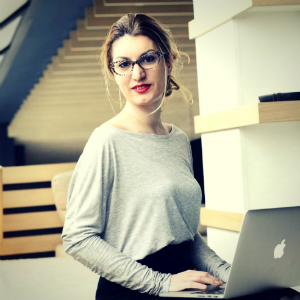Kids born after the year 2000 – Generation Z, are growing up in times when virtual reality is just a pair of 3D glasses away and the internet has grown into a necessity and a shadow of everyone. Every coin though has two sides. Apart from the great conveniences provided by new technology including immediate access to information, it is also dangerous for teenagers. In order to avoid technology threats for children, their parents and teachers should be digitally literate. Promoting digital literacy is the mission of the DigitalKidz initiative.
Ivelina Atanasova, Chairperson of DigitalKidz Foundation, believes it is important for adults to upgrade their technological skills and competences, understand the essence of technology and become aware of threats.
 “We still instruct children not to poke in wall plugs and not to play with sharp objects, but we are not aware that the technology they learn intuitively is the source of threats for their security and identity. When not used with measure technology can annihilate the human in humans and replace communication and empathy with a chat on the mobile. Statistics suggest that more than half of parents are not aware of parent control programs. Hence, they are not aware what their kids are doing online and what kind of content they use. More than 80 percent of present-day kids already use the internet even before they enter puberty. One in three children has been the target of sexual messages online, one in six has been exposed to cyber bullying which may also grow into offline bullying. We instruct our kids not to talk to strangers in the street but we are not able to help and protect them while they are online.”
“We still instruct children not to poke in wall plugs and not to play with sharp objects, but we are not aware that the technology they learn intuitively is the source of threats for their security and identity. When not used with measure technology can annihilate the human in humans and replace communication and empathy with a chat on the mobile. Statistics suggest that more than half of parents are not aware of parent control programs. Hence, they are not aware what their kids are doing online and what kind of content they use. More than 80 percent of present-day kids already use the internet even before they enter puberty. One in three children has been the target of sexual messages online, one in six has been exposed to cyber bullying which may also grow into offline bullying. We instruct our kids not to talk to strangers in the street but we are not able to help and protect them while they are online.”
Ivelina Atanasova defines the growing number of teachers in pre-retirement age as a challenge to digital literacy:
“In cases when they refuse to align with technology and transform their methods of teaching, communication between teachers and pupils becomes ineffective. Today’s kids are visually oriented. To acquire knowledge they need to use their sensitivity: to touch things and experience them. Technology transforms not only entertainment but also the way we accept the world, learn and communicate. This means that the way knowledge is delivered in school has to change.”
Long hours watching TV or using the computer may lead to sedentary lifestyles and decreased physical activity among children. Ivelina Atanasova’s view:
“Parents should be aware how to encourage physical activity of children. This does not necessarily mean active sport. There are many games and activities that are also relevant. Sometimes technology may impair creativity. Well, it is important to make clear that adults have to help achieve the needed balance. To protect Bulgarian kids from the threats in the worldwide web, their parents should be prepared to handle them. I believe that before condemning technology for what it takes away, we should first see how we prepare our children for the proper and efficient use of technology.”
English Daniela Konstantinova
For the tenth consecutive year in the days around June 21, many countries across the world celebrate the International Day of Yoga. In Bulgaria, from June 15 to 23, a total of 44 settlements, including the largest cities - Sofia, Plovdiv, Stara Zagora,..
The Black Sea city of Varna will embrace the spirit of the French Festival of Music on June 21 . The event, organised by Alliance Française Varna with the financial support of Varna Municipality, Varna State Opera and Pontica Solutions, will feature..
Bulgarian Nikolay Todorov aka Nick is among the contenders for the best paella master in the world . The World Paella Day Cup is a culinary paella championship that will be held for the seventh time in Valencia with participants from all over the world...
Skopje aims to attract cargo from Europe to Thessaloniki with a new railway line The construction of the railway line along Corridor 10 is a..

+359 2 9336 661
